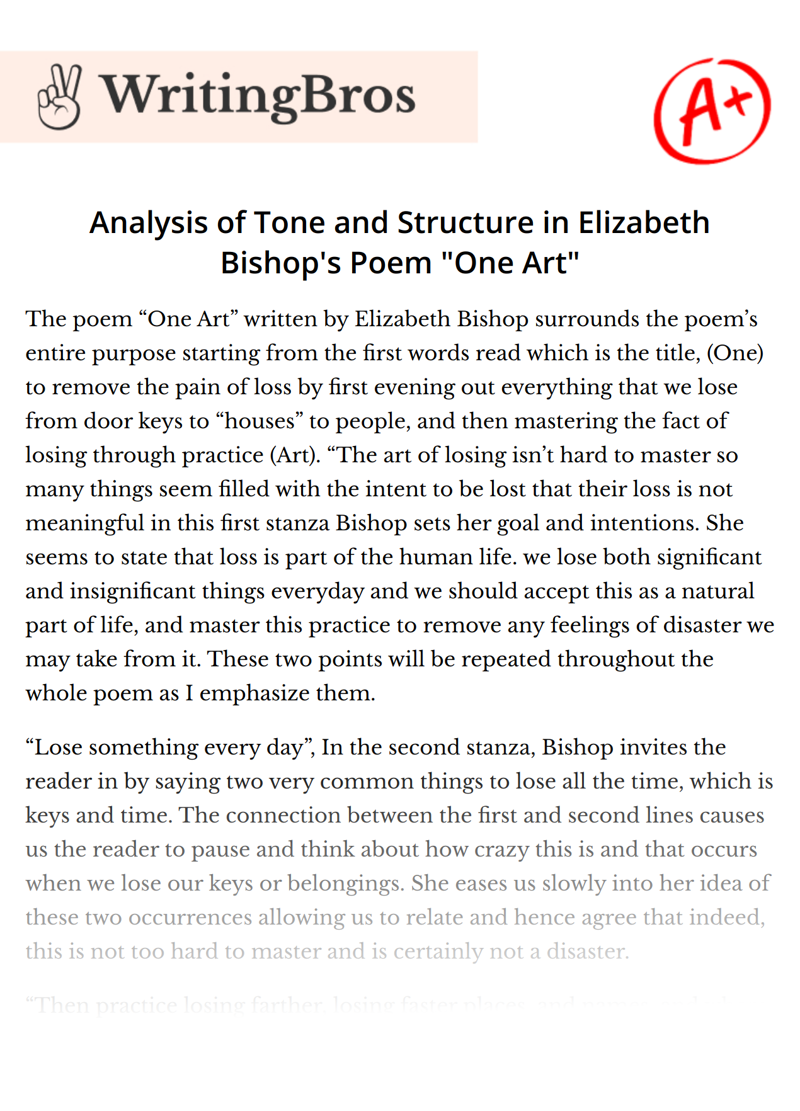Analysis of Tone and Structure in Elizabeth Bishop's Poem "One Art"

The poem “One Art” written by Elizabeth Bishop surrounds the poem’s entire purpose starting from the first words read which is the title, (One) to remove the pain of loss by first evening out everything that we lose from door keys to “houses” to people, and then mastering the fact of losing through practice (Art). “The art of losing isn’t hard to master so many things seem filled with the intent to be lost that their loss is not meaningful in this first stanza Bishop sets her goal and intentions. She seems to state that loss is part of the human life. we lose both significant and insignificant things everyday and we should accept this as a natural part of life, and master this practice to remove any feelings of disaster we may take from it. These two points will be repeated throughout the whole poem as I emphasize them.
“Lose something every day”, In the second stanza, Bishop invites the reader in by saying two very common things to lose all the time, which is keys and time. The connection between the first and second lines causes us the reader to pause and think about how crazy this is and that occurs when we lose our keys or belongings. She eases us slowly into her idea of these two occurrences allowing us to relate and hence agree that indeed, this is not too hard to master and is certainly not a disaster.
“Then practice losing farther, losing faster places, and names, and where it was you meant to travel”, The emotional tension begins to build in the third stanza as Bishop encourages us to further our practices, deepening the sight of our loss.
Here, the things we lose are more related to thought and memory people, places and plans that, as time, naturally escape our head and no longer form part of our lives. This is harder for the reader to accept and the familiar confirmation that this will not bring disaster. House keys and an hour here and there seem like a commonplace and natural and to consciously losing these things to aid our mastering of losing does not seem difficult at all. Places, names, and plans require a larger effort and a lot of emotional distancing that the second stanza did not call for. There is a subtle change from the third to the fourth stanza, a split in keeping with the poem’s structure. the author switches from addressing the reader to draw on her own experience. It is here that Bishop begins to elaborate on her structural details and in a carefully impassive tone. “I lost my mother’s watch, ” she says, a saying that seems to come from nowhere. However, the casual tone is disappearing the inexplicable mention of this personal aspect of the authors life has upped the emotional stakes as she knows she has lost something important that belonged to her mother.
As the stanza continues, it becomes clear that this is a further attempt to demonstrate the universality of loss. The picture becomes bigger and the distance larger. The exclamation: “And look!” displays more emotion, despite its apparent weird tone. Now Bishop tells us to look at our losses on a bigger scale: the houses we lived in not so disastrous except for the use of the word “loved” here. Indeed, these were just places we lived in, but we nonetheless also loved them. So overall Bishop's big picture to the reader is loss happens and it's going to keep on happening but as humans, we can't let things destroy us forever as we have to push through to face our fears and embrace the loss and use it as a lesson for our future to come.
Cite this Essay
To export a reference to this article please select a referencing style below

